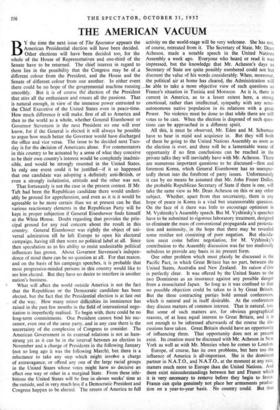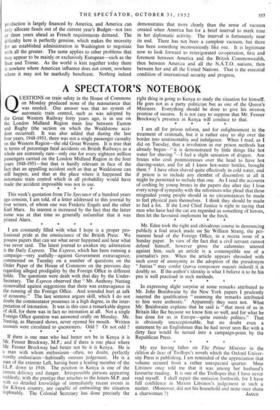THE AMERICAN VACUUM
BY the time the next issue of The Spectator appears the American Presidential election will have been decided. Other elections will have "I:teen decided too, for the whole of the House of Representatives and one-third of the Senate have to be returned. The chief interest in regard to them lies in the possibility that the Congress may be of -.a different colour from the President, and the House and the Senate of different colour from one another. In either event there could be no hope of the governmental machine running smoothly. But it is of course the election of the President that stirs 'all the enthusiasm and rouses all the passions. That is natural enough, in view of the immense power entrusted to the Chief Executive of the United States even in peace-time. How much difference it will make, first of all to America and then to the world as a whole, whether General Eisenhower or Governor Stevenson is the next President no one will ever know, for if the General is elected it will always be possible to argue how much better the Governor would have discharged the office and vice versa. The issue to be decided next Tues- day is for the decision of Americans alone. For commentators in this country to be actuated by a sense of what they conceive to be their own country's interest would be completely inadmis- sible, and would be strongly resented in the United States. In only one event could it be justified—if it so happened that one candidate was adopting a . definitely anti-British, or even a strongly isolationist, attitude and the other was not.
That fortunately is not the case in the present contest. If Mr. Taft had been the Republican candidate there would undeni- ably be ground for apprehension, and even as it is it would be agreeable to be. more certain than we at present can be that various reactionary elements in the Republican Party will be kept in proper subjection if General Eisenhower finds himself at the White House. Doubt regarding that provides the prin- cipal ground for any real concern about the result in this country. General Eisenhower was rightly the object of uni- versal admiration till he left Europe to open his electoral campaign, having till then worn no political label at all. Since then speculation as to his ability to resist undesirable political influences has grown. About Governor Stevenson's indepen- dence of mind there can be no question at all. For that reason, and on the basis of his campaign speeches, it is probable that most progressive-minded persons in this country would like to see him elected. But they have no desire to interfere in another nation's business.
What will affect the world outside America is not the fact that the Republican or the Democratic candidate has been elected, but the fact that the Presidential election is at last out of the way. How many minor difficulties its imminence has raised in the past few months in the field of international nego- tiation is imperfectly realised. To begin with, there could be no long-term commitments. One President cannot bind his suc- cessor, even one of the same party, and in any case there is the uncertainty of the complexion of Congress to consider. The American Government in its external relations is not as ham- strung yet as it can be in the interval between an election in November and a change of Presidents in the following January (not so long ago it was the following March), but there is a reluctance to take any step which might involve a charge of extravagance, or offend any one of the large racial groups in the United States whose votes might have so decisive an effect one way or other in a marginal State. From these inhi- bitions the United States will be free in eleven weeks' time at the outside, and in very much less if a Democratic President and Congress happen to be elected. The return of America to full activity on the world-stage will be very welcome. She has not, of course, retreated from it. The Secretary of State, Mr. Dean Acheson, made a notable speech in the United Nations Assembly a week ago. Everyone who heard or read it was impressed, but the knowledge that Mr. Acheson's days as Secretary of State are quite possibly numbered could not but discount the value of his words considerably. When, moreover, the political air at home has cleared, the Administration will __be able to take a more objective view of such questions as France's situation in Tunisia and Morocco. As it is, there is current in America, as to a lesser extent here, a strong emotional, rather than intellectual, sympathy with any semi- autonomous native 'population in its relations with a great Power. No violence must be done to that while there are still votes to be cast. When the election is disposed of such ques- tions can be approached in a different spirit.
All this, it must observed, Mr. Eden and M. Schuman have to bear in mind and acquiesce in. But they will both of them be going to the United Nations Assembly as soon as the election is over, and there will be a lamentable waste of opportunity if no firm conclusions can be reached in the private talks they will inevitably have with Mr. Acheson. There are numerous important questions to be discussed—first and foremost Korea, which General Eisenhower has so unexpec- tedly thrust into the forefront of party issues. Unfortunately it can by no means be assumed that Mr. John Foster Dulles, the probable Republican Secretary of State if there is one, will take the same view as Mr. Dean Acheson on this or any other subject. Whether, apart from that uncertainty, there is any hope of peace in Korea is a vital but unanswerable question. On the face of it there was little to encourage optimism in M. Vyshinsky's Assembly speech. But M. Vyshinsky's speeches have to be submitted to rigorous laboratory treatment, designed to eliminate the mass of conventional propaganda and protesta- tion and animosity, in the hope that there may be revealed some residue not consisting of pure negation. But elucida- tion must come before negotiation, for M. Vyshinsky's contribution to the Assembly discussion was far too studiously nebulous to provide any basis in its present form.
One other problem which must plainly be discussed is the Pacific Pact, in which Great Britain has no part, between the United States, Australia and New Zealand. Its raison d'etre is perfectly clear. It was offered by the United States to the two Dominions as an insurance against any possible danger from a resuscitated Japan. So long as it was confined to that no possible objection could be taken to it by Great Britain. But the three contracting parties hold annual conferences, which is natural and in itself desirable. At the conferences they discuss matters of common interest. That is natural, too. But some of such, matters are, for obvious geographical reasons, of at least equal interest to Great Britain, and it is not enough to be informed afterwards of the course the dis- cussions have taken. Great Britain should have an opportunity of influencing them. That opportunity does not at present exist. Its creation must be discussed with Mr. Acheson in New York as well as with Mr. Menzies when he comes to London.
Europe, of course, has its own problems, but here too the influence of America is all-important. She is the dominant partner in N.A.T.O., and N.A.T.O., at the moment at any rate, matters much more to Europe than the United Nations. And there exist misunderstandings between her and France which it is very necessary to remove before they begin to fester. France can quite genuinely not place her armaments produc- tion on a year-to-year basis. No country could. But that production is largely financed by America, and America can only allocate funds out of the current year's Budget—not two or three years ahead as French requirements demand. The difficulty here is perfectly genuine, which makes the necessity for an established administration in Washington to negotiate with all the greater. The same applies to other problems that may appear to be mainly or exclusively European—such as the Saar and Trieste. As the world is knit together today there is nowhere where American influence does not count, nowhere where it may not be markedly beneficent. Nothing indeed demonstrates that more clearly than the sense of vacuum created when America has for a brief interval to mark time in her diplomatic activity. The interval is fortunately near its end. There has not been a complete vacuum, but there has been something inconveniently like one. It is legitimate now to look forward to reinvigorated co-operation, first and foremost between America and the British Commonwealth, then between America and all the N.A.T.O. nations, then between her and all the United Nations. That is the essential condition of international security and progress.



































 Previous page
Previous page